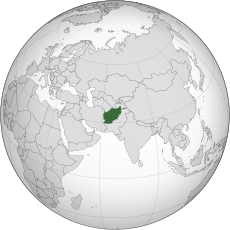
The United Nations Assistance Mission in Afghanistan is a UN Special Political Mission tasked with assisting the people of Afghanistan.
United Nations Security Council Resolution 1746, adopted unanimously on March 23, 2007, after reaffirming all resolutions on the situation in Afghanistan, including resolutions 1659 (2006) and 1662 (2006), the Council extended the mandate of the United Nations Assistance Mission in Afghanistan (UNAMA) for an additional period of twelve months, until March 23, 2008.

The United Nations Assistance Mission for Iraq (UNAMI) was formed on 14 August 2003 by United Nations Security Council (UNSC) Resolution 1500 at the request of the Iraqi government to support national development efforts.

United Nations Security Council Resolution 1917, adopted unanimously on March 22, 2010, after recalling its previous resolutions on Afghanistan, in particular resolutions 1868 (2009), 1662 (2006) and 1659 (2006), the Council extended the mandate of the United Nations Assistance Mission in Afghanistan (UNAMA) until March 23, 2011 and realigned its mandate to assist with government-led recovery efforts.

United Nations Security Council resolution 965, adopted unanimously on 30 November 1994, after reaffirming all resolutions on the situation in Rwanda, particularly resolutions 872 (1993), 912 (1994), 918 (1994), 925 (1994) and 955 (1994), the Council extended the mandate of the United Nations Assistance Mission for Rwanda (UNAMIR) until 9 June 1995 and expanded its operations.

United Nations Security Council Resolution 1919, adopted unanimously on April 29, 2010, after recalling resolutions 1674 (2006), 1894 (2009) on the protection of civilians in armed conflict, 1612 (2005) and 1882 (2009) on children in armed conflict, 1502 (2003) on the protection of humanitarian and United Nations personnel, and 1325 (2000), 1820 (2008), 1888 (2009), and 1889 (2009) on women, peace, and security, the Council extended the mandate of the United Nations Mission in Sudan (UNMIS) until April 30, 2011 with the intention of renewing it further if necessary.

United Nations Security Council resolution 1401, adopted unanimously on 28 March 2002, after recalling all previous resolutions on the situation in Afghanistan, including resolutions 1378 (2001), 1383 (2001) and 1386 (2001), the Council endorsed the establishment of the United Nations Assistance Mission in Afghanistan (UNAMA). It would replace the longstanding United Nations Special Mission to Afghanistan.

United Nations Security Council Resolution 1936, adopted unanimously on August 5, 2010, after recalling all previous resolutions on the situation in Iraq, including resolutions 1500 (2003), 1546 (2004), 1557 (2004), 1619 (2005), 1700 (2006), 1770 (2007), 1830 (2008) and 1883 (2009), the Council extended the mandate of the United Nations Assistance Mission in Iraq (UNAMI) for a further period of 12 months, until July 31, 2011.

United Nations Security Council resolution 1471, adopted unanimously on 28 March 2003, after reaffirming all resolutions on the situation in Afghanistan, the Council extended the mandate of the United Nations Assistance Mission in Afghanistan (UNAMA) for an additional period of twelve months until 28 March 2004.

United Nations Security Council resolution 1536, adopted unanimously on 26 March 2004, after reaffirming all resolutions on the situation in Afghanistan, particularly Resolution 1471 (2003), the council extended the mandate of the United Nations Assistance Mission in Afghanistan (UNAMA) for an additional period of twelve months until 26 March 2005.
United Nations Security Council Resolution 1943, adopted unanimously on October 13, 2010, after reaffirming all resolutions on the situation in Afghanistan and terrorism, including resolutions 1267 (1999), 1368 (2001), 1373 (2001), 1386 (2001), 1510 (2003), 1822 (2008), 1833 (2008), 1890 (2009), 1904 (2009) and 1917 (2010), the Council extended the authorisation of the International Security Assistance Force (ISAF) operating in the country for a period of one year.

The United Nations Police (UNPOL) is an integral part of the United Nations peace operations. Currently, about 11530 UN Police officers from over 90 countries are deployed in 11 UN peacekeeping operations and 6 Special Political Missions. The "mission of the UN Police is to enhance international peace and security by supporting Member States in conflict, post-conflict and other crisis situations to realise effective, efficient, representative, responsive and accountable police services that serve and protect the population".

United Nations Security Council resolution 1589, adopted unanimously on 24 March 2005, after reaffirming all resolutions on the situation in Afghanistan, particularly Resolution 1536 (2004), the council extended the mandate of the United Nations Assistance Mission in Afghanistan (UNAMA) for an additional period of twelve months until 24 March 2006.

United Nations Security Council resolution 1623, adopted unanimously on 13 September 2005, after reaffirming all resolutions on the situation in Afghanistan, particularly resolutions 1386 (2001), 1413 (2002), 1444 (2002), 1510 (2003) and 1563 (2004), and resolutions 1368 (2001) and 1373 (2001) on terrorism, the council extended the authorisation of the International Security Assistance Force (ISAF) until mid-October 2006.

United Nations Security Council Resolution 1659, adopted unanimously on February 15, 2006, after recalling previous resolutions on the situation in Afghanistan, particularly resolutions 1378 (2001), 1383 (2001) and 1589 (2005), the Council endorsed the "Afghanistan Compact" between the Afghan government and international community concerning the future of the country.

United Nations Security Council Resolution 1662, adopted unanimously on March 23, 2006, after reaffirming all resolutions on the situation in Afghanistan, including resolutions 1589 (2005) and 1659 (2006), the Council extended the mandate of the United Nations Assistance Mission in Afghanistan (UNAMA) for an additional period of twelve months.

United Nations Security Council Resolution 1690, adopted unanimously on June 20, 2006, after reaffirming previous resolutions on East Timor (Timor-Leste), particularly resolutions 1599 (2005) and 1677 (2006), the Council renewed the mandate of the United Nations Office in Timor-Leste (UNOTIL) for two months until August 20, 2006.

United Nations Security Council Resolution 2001, adopted unanimously on July 28, 2011, after recalling all previous resolutions on the situation in Iraq, including resolutions 1500 (2003), 1546 (2004), 1557 (2004), 1619 (2005), 1700 (2006), 1770 (2007), 1830 (2008), 1883 (2009) and 1936 (2010), the Council extended the mandate of the United Nations Assistance Mission in Iraq (UNAMI) for a further period of 1 year.
United Nations Security Council Resolution 1868 was unanimously adopted on 23 March 2009.
United Nations Security Council Resolution 1806 was unanimously adopted on 20 March 2008.













